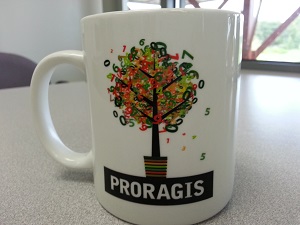Conservation in all of its many forms is incredibly important for parks and recreation which is one of the reasons why it is part of the NRPA Three Pillars. Core to the mission of public parks and recreation is the preservation of natural resources and the promotion of good conservation and stewardship practices.
At NRPA we believe in this so much so that here at headquarters in Ashburn, VA we decided to take the Loudoun County, VA Green Business Challenge.
The Green Business Challenge is a friendly points-based competition and certification process that challenges and encourages businesses to implement more efficient and sustainable practices. Based on points, you can earn Platinum, Gold, Silver, Certified or Participant level certification.
Why did we participate in the challenge?

It may just look like a mug, but it actually is helping keep NRPA green - and yes of course it says PRORAGIS!
Besides being able to evaluate our “green” business practices and getting a certification to boot, we saw a lot of benefits. The challenge would help us evaluate and better understand ways in which we can, and are, minimizing the environmental impact we have on the community around us, helping us stand out as an organization committed to leading conservation best practices locally and nationally. Not only that, it would help us create a healthier work environment and it could even help improve our bottom line by uncovering savings through better conservation practices.
All good things, right? And all good things you could benefit from too by doing similar challenges in your community!
The Green Business Challenge focuses on five specific categories: Education and Outreach, Energy, Water, Waste, and Transportation. Here are some highlights of what we are doing in these five categories to improve our practices and be good stewards for the environment:
- Education & Outreach – NRPA is committed to serving our members and the field by providing resources, education and information on conservation so that you can be conservation leaders in communities across the country.
- Energy – Here at headquarters we have been working to be energy efficient. We’ve performed energy audits, optimized building operating parameters, installed new energy efficient equipment and appliances, and switched to T-8 light bulbs which are more energy-efficient type of lighting.
- Water – Water is a critical component of conservation. We inventoried all of our domestic water fixtures to identify conservation opportunities, installed a programmable water system for irrigation and included native plants in our landscaping to help conserve and be more efficient with water.
- Waste – Our headquarters maintains a solid office recycling program; we use paper towels made from 100% recycled fiber, our copier paper is 100% post-consumer content, and we promote “green” office kitchen pantries with minimal disposable items and chilled water coolers. Heck, we even made coffee mugs with the PRORAGIS logo on them for all employees to share!
- Transportation – In our area of the country high volume of traffic is a big issue. We offer staff telework options to cut down on daily commutes to and from the office helping reduce the area’s overall transportation footprint and in the summer, NRPA provides lunch to staff two days a month to help reduce the number of driving trips at lunch.
After going through the challenge we are pleased to see how much we do already to keep conservation at the forefront and have learned some things along the way. Moreover, it looks like the NRPA headquarters will be Gold certified by the end of the challenge! We can all feel proud about that.
How are you practicing good conservation practices at your park and recreation agencies? Tell us about a time you took a conservation challenge or about a challenge your community may offer? In the five areas of the challenge, what are some best practices you’ve put into place at your facilities? Tell us what you are doing in your community and share your ideas to promote sustainable initiatives and encourage environmental stewardship in the comment area below.
Ted Mattingly is NRPA's Director of Facilities & Administrative Services.

